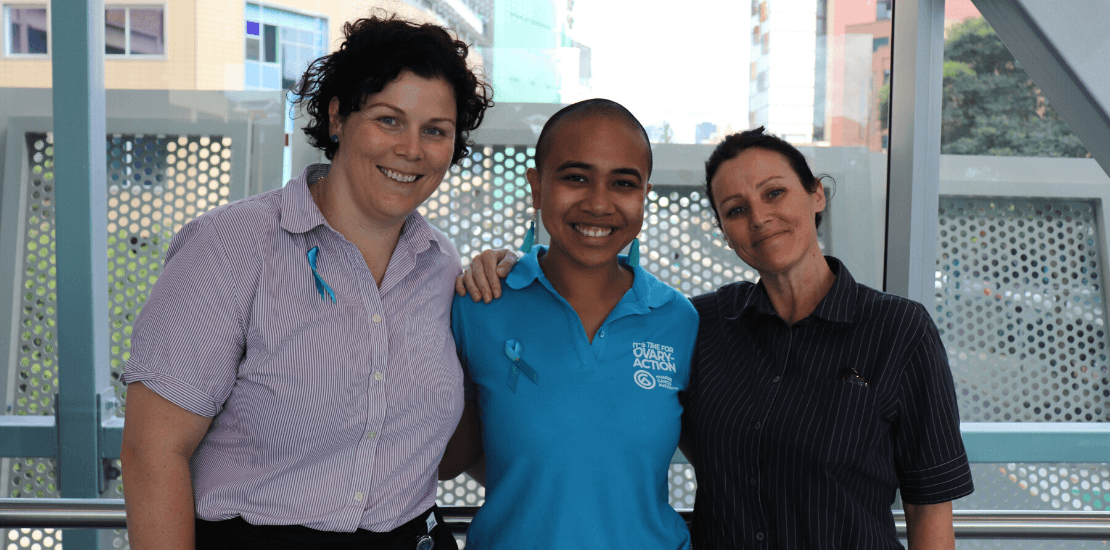Alisi’s story

At the age of 25, Alisi thought she was bulletproof.
“I wanted to become a flight attendant for Emirates. In order to qualify you need to do a full medical check. So, before I applied, I booked in for the standard medical checks with my GP and thought that would be it,” says Alisi.
“I had been bleeding on and off for about a month, but thought it was just normal. I mentioned this to the GP and she decided to do an examination.
“It didn’t take very long for her to say ‘You need to book an ultrasound—as soon as you can’. I wasn’t too concerned so I booked in for a week later,” says Alisi.
The ultrasound showed two very large cysts on both Alisi’s left and right ovaries and she was immediately referred to Dr Lew Perrin at Mater.
“My sister came along with me to my appointment with Dr Perrin. I asked him what he thought of my ultrasounds and he said he needed to consult with a colleague.
“When Dr Perrin came back into the room, he said ‘I’m a little concerned, so I’m going to book you in for a biopsy’. That’s when I knew something wasn’t quite right. Soon after, Alisi was booked in for her biopsy.
“When I came to, the nurse said to me ‘I’ve just called your mother…the surgeon wants to discuss your results and she wants your mum to be here’.
After an agonising wait, Alisi was told she had stage three ovarian cancer. She had two grapefruit-sized tumours—one on each ovary.
“It made sense why my abdomen had always been hard when I’d felt it, and why I always felt tired… but I always assumed nothing was wrong because I was young.”
“The diagnosis really hit my family hard. We had lost our grandmother to bowel cancer earlier that year and were all still in mourning. And five years prior my mum was diagnosed with breast cancer.
Two weeks after her initial diagnosis, Alisi underwent a full hysterectomy. Unfortunately, the cancer has spread to some of her other organs, including her diaphragm and large bowel. What was meant to be four hours, turned in to an eight hour surgery.
“They didn’t know it was going to be that complicated when they went in—what was meant to be a three week recovery turned into seven weeks. I had to learn how to walk and breathe again on my own.
“After my surgery I had an Ileostomy bag to help drain waste from my small intestine, but there were complications and I was losing a lot of fluid. I lost 20 kilos in less than a month, so they had to remove the bag so I could gain weight again and start going through chemotherapy.
“Chemotherapy: I wish it was the one thing you didn’t have to do, because you just feel awful—it affects your body on so many different levels.
“I remember my third round of chemo being the hardest. It was where I thought ‘I can’t do this anymore’. I told my family this and they told me that I had to keep going and I remember saying ‘I don’t want to, I don’t want to’! But I thought if others can do it, like my mum, so can I!
Two years on from her initial diagnosis and Alisi now has a fresh outlook on life.
“There is light at the end of the tunnel—it has been a difficult journey to get here but I have pulled through thanks to the support of my friends, family and community,” she said.
“I am studying a Diploma of Business at TAFE which will lead into a business degree, plus keeping on top of my health and working out at the gym regularly, which has also been great for my mental health.
Alisi is now making it her mission to educate people on ovarian cancer and support others out there who are going through something similar.
“Just because you’re young, it doesn’t mean you’re bulletproof. I thought I was bulletproof. You don’t think you’re going to get cancer in your twenties—you think you’ll have fun and party—you don’t think of going to get a health check, but you really should.
“The symptoms of ovarian cancer are very vague, but honestly if you feel like something isn’t right, just go to the doctor. It doesn’t matter what it may or may not be, just go!”
Unfortunately ovarian cancer statistics haven’t altered much in over 20 years and at Mater, we think it’s time for change.
Mater researcher Professor John Hooper and his team are working to create more effective detection solutions, for patients during treatment. This works is supported by their trials with low doses of the drug 2-deoxy-D-glucose used in treatment for better results to overcome chemotherapy resistance and stop tumour growth. Your support of Mater’s Cars for Cancer Lottery helps patients like Alisi during their treatment and you’re driving vital medical research to help future cancer patients. Thank you!
